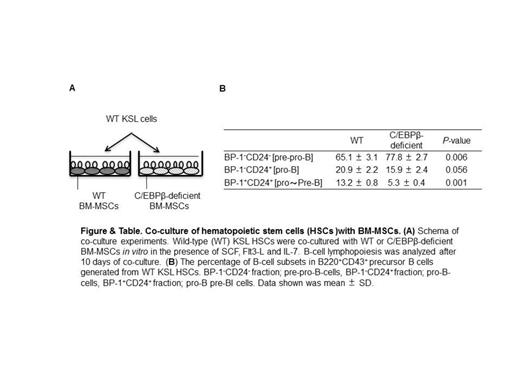Abstract
B-cell lymphopoiesis is critically dependent on the bone marrow microenvironment. Early B-cell lymphopoiesis is regulated by direct interaction with bone marrow stromal cells (BM-MSCs) and by soluble factors produced by BM-MSCs. The roles of transcription factors expressed by hematopoietic cells that involve early B-cell lymphopoiesis have been well investigated; those include PU.1, Ikaros, E2A, early B-cell factor, and paired box protein 5. By contrast, transcriptional factors expressed by BM-MSCs that are important for early B-cell lymphopoiesis remain unknown. We show that CCAAT-enhancer binding protein (C/EBP) β expressed by BM-MSCs contributes to the early B-cell lymphopoiesis. In addition, the proliferation of precursor B-cell acute lymphoblastic leukemia (B-ALL) cells is also associated with BM-MSCs, in which C/EBPβ is one of the regulatory transcription factors.
When c-kit+ Sca-1+ lineage- (KSL) HSCs from Wild-type (WT) mice were co-cultured with C/EBPβ-deficient BM-MSCs in the presence of stem cell factor (SCF), Flt3-L, and interleukin (IL)-7 (Figure A), the generation of hematopoietic cells from KSL cells was significantly lower than when they were co-cultured with WT BM-MSCs. In addition, the generation of B220+ B-cells from KSL cells was also significantly lower when they were co-cultured with C/EBPβ-deficient BM-MSCs than when co-cultured with WT BM-MSCs. Detailed analysis of the generated B-cell subsets showed that differentiation of KSL cells into precursor B-cells was reduced and differentiation from pre-pro-B-cells to pro-B-cells/pre-BI cells was suppressed when cells were co-cultured with C/EBPβ-deficient BM-MSCs (Figure B). Therefore, C/EBPβ was an indispensable transcriptional factor expressed by BM-MSCs for supporting the differentiation of HSCs into precursor B-cells.
We next examined the expression of B-cell lymphopoiesis-associated molecules in C/EBPβ-deficient BM-MSCs by quantitative real-time PCR analysis. Levels of IL-7 and SCF mRNA tended to be lower in C/EBPβ-deficient BM-MSCs than in WT BM-MSCs, although the difference was not statistically significant in our analysis. Levels of CXCL12/SDF-1 and Flt3-L mRNA were significantly lower in C/EBPβ-deficient BM-MSCs than in WT BM-MSCs. In addition, the protein concentration of CXCL12/SDF-1 was significantly lower in the culture supernatant of C/EBPβ-deficient BM-MSCs than that of WT BM-MSCs. The concentration of CXCL12/SDF-1 in the supernatant of BM-MSC co-cultures strongly correlated with the number of B220+ B-cells that differentiated from KSL cells. Thus, the impaired differentiation of HSCs into B-cells is associated, at least in part, with reduced production of CXCL12/SDF-1 by C/EBPβ-deficient BM-MSCs.
Precursor B-ALL is a hematological disease characterized by malignant transformation of precursor B-cells. We examined whether C/EBPβ expressed by BM-MSCs has effects on the precursor B-ALL cells. When the precursor B-ALL cell line BaF3/Bcr-Abl cells was co-cultured with WT BM-MSCs, the number of BaF3/Bcr-Abl cells was significantly increased than when they were cultured alone. Interestingly, when the precursor B-ALL cell line BaF3/Bcr-Abl cells was co-cultured with C/EBPβ-deficient BM-MSCs, the number of BaF3/Bcr-Abl cells was reduced to the level similar to when they were cultured alone. This was true in co-cultures with BM-MSCs that were pharmacologically treated to down-regulate the C/EBPβ expression. As well as the correlation of SDF-1 concentration in co-cultures with precursor B-cell differentiation, the proliferation of BaF3/Bcr-Abl cells was associated with the correlation of SDF-1 concentration in co-cultures.
No relevant conflicts of interest to declare.
Author notes
Asterisk with author names denotes non-ASH members.


This feature is available to Subscribers Only
Sign In or Create an Account Close Modal